ADVERTISEMENT
Filtered By: Lifestyle
Lifestyle
(Not All) The People’s Pope: Thoughts on Francis from those on the outskirts of the Church
By BARBARA MARCHADESCH, GMA News
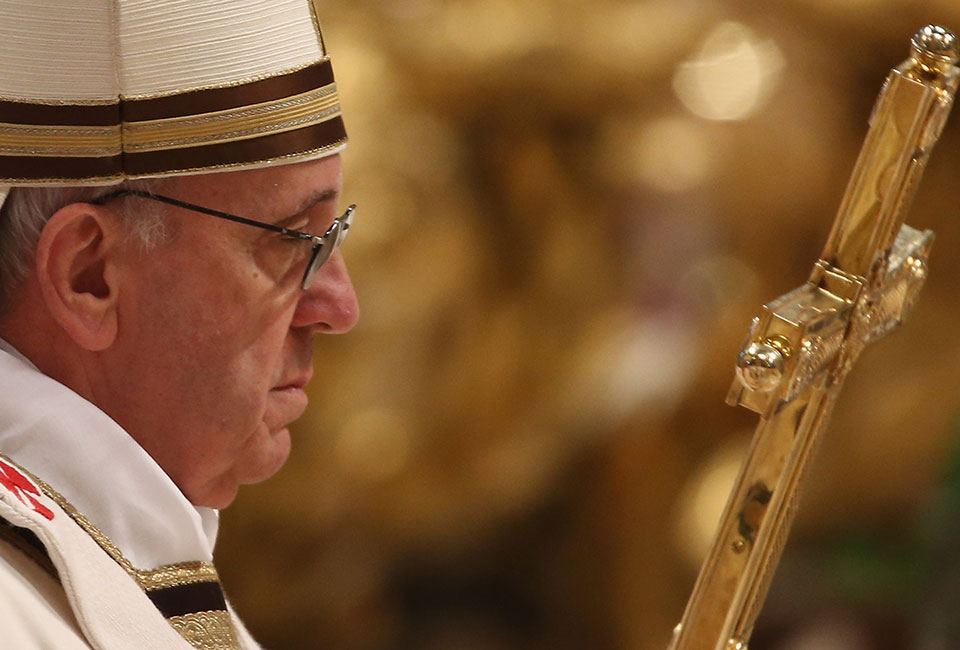
(Updated 3:03 p.m.) Somewhere along the way he gained the moniker "The People's Pope."
The legend began growing mere hours after Cardinal Bergoglio’s election as the absolute sovereign of Vatican City and the 1.2-billion-strong Catholic Church. In no time at all he went from being Jorge Mario Who? to being Francis, the fascinating anti-Benedict: the humble priest who paid for his hotel bill himself; the down-to-earth guy who called his local kiosk in Buenos Aires to cancel his newspaper subscription because, well, as the Pope he’d be living in the Vatican now.
He eschews the fancy Papal vestments and trappings favored by his predecessor. He moves around the city in a Ford Focus, and lives in a small apartment in a guest house instead of the papal rooms in the Apostolic Palace.
His first official visit outside of Rome was to Lampedusa, the Italian island where thousands of African refugees wash up after fleeing conflict or economic difficulties in their own country. There, he celebrated Mass with the migrants and said that he hoped “people will have the courage to welcome those in search of a better life.”
He was the pope who called a woman who had been raped by Argentinian cops and offered her words of comfort. He was the pope who, instead of washing the feet of men—specifically priests—according to an age-old custom, instead went to a juvenile detention center and washed the feet of the inmates, including Muslims and women.
He rails against corporate greed, and has been revealed as a major player behind the scenes in the thawing of US-Cuba relations.
And last month, his idea of a Christmas present to the Vatican was a speech blasting the Curia—the Church’s powerful central administration—for being “sick with power and greed.”
These and many more instances have endeared him to people around the world, even those who aren’t Catholic or who have views that go against the Church’s official position. “I’m not Catholic, but I really like this Pope,” is a common sentiment expressed online. “I don’t agree with the Church’s views, but I like Francis,” is another.
Just before his arrival in the Philippines, GMA News Online reached out to several Filipinos to find out what they think of him. Some are non-Catholics, and many are people who, whether Catholic or not, may not feel wholly embraced by the Church, such as LGBT individuals and those in favor of contraceptive use and other reproductive health measures. What do you think about the upcoming papal visit?, we asked. What do you think of the pope? Below are their replies.
Acceptance
"I've been confused or noncommittal in my religious beliefs for a while,” said ballerina Mika Fabella, who describes herself as an “informal” agnostic.
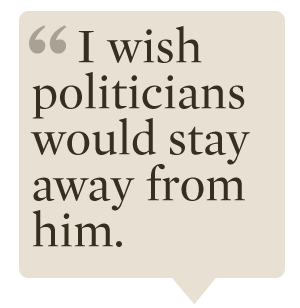
“I was born into Opus Dei Catholicism and raised to believe that if I didn't make time for prayer, then I was being selfish, materialistic, and sinful. People pray in different ways, and even define ‘prayer’ in different ways. I learned this when I got out of Catholic school.
“When I read about Pope Francis' statements, it's as if after so many years of being made to feel guilty for not being religious, someone is finally saying, ‘It's okay, as long as you're happy.’ It's the best form of acceptance, understanding, goodwill and love.”
Entrepreneur Urim Hernandez, a practicing Mormon, said he is “happy” the Pope is coming to visit. “I understand the excitement and anticipation,” he said.
“I like Pope Francis; he's more approachable than his predecessor. I also like where he is going with enforcing the principles behind the doctrine rather than the rules surrounding it... Though I wish politicians would stay away from him,” he also said.
Writer Paul Catiang, who identifies himself as an atheist, said he’s “a little ambivalent” about the Pope’s visit. However, he added, “I do think he's the best pope I've seen so far, at least in my lifetime, what with his stands on evolution and how he reconciles science with his faith.”
‘A total hypocrite’
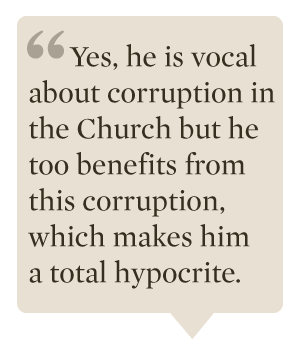 IT project manager Richmon M. Pancho, who said he is agnostic, has a more negative view of the Pope and the Church.
IT project manager Richmon M. Pancho, who said he is agnostic, has a more negative view of the Pope and the Church. “I think this pope is definitely shaking the Catholic faith with his unorthodox way of doing things,” he said. “But before Catholics go gaga over this man, I'd like them first to think about the underpinnings of his misdemeanor. Yes, he is vocal about corruption in the Church, but he too benefits from this corruption, which makes him a total hypocrite.
“He tells people to accept gay people, provided of course we reserve all the camp in our fabulous bodies behind closed doors.”
Judging ‘Who am I to judge?’
Red Tani, president of the group Filipino Freethinkers, said that one of his problems with Francis is that a lot of his statements are misreported or misinterpreted. His famous words, "Who am I to judge?”, he said, was taken by many to be a wholesale acceptance of gay people. The topic had come up in a plane interview when he was asked about Msgr. Battista Ricca, who had been accused of homosexual acts in Uruguay.
However, said Tani, “What he said was, if someone who is gay seeks God and has good will, who am I to judge? What the Pope said is that if a gay person apologizes, stops being gay and goes back to the Catholic Church, who are we to condemn him? That's very different from what people are saying he said.”
But the Pope’s statement, as reported by many news outlets, has been hailed by many for at least the more compassionate tone it seems to strike. 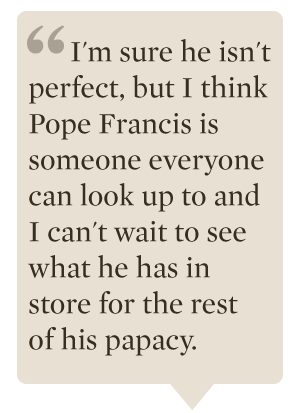

The tiniest bit of hope
“I honestly feel quite excited,” said 16-year-old agnostic Paolo Sison. “I think Pope Francis is one of the better Popes we've seen lately and as a member of the LGBT community (I'm gay), it's nice to see a Pope who's more welcoming. Part of what makes me call myself agnostic or deist aside from Catholic is that while I do believe in the existence of a God, there are many church teachings that don't sit well with me.
“Realistically, I don't see teachings on gay marriage changing any time soon, but the small reforms that Pope Francis is making creates the tiniest bit of hope in me that we'll see the Catholic Church change for the better.
“I'm sure he isn't perfect, but Catholic or not, I think Pope Francis is someone everyone can look up to and I can't wait to see what he has in store for the rest of his papacy.”
‘The real deal’
For another non-Catholic, Pope Francis might be “the real deal.”
“As an atheist, I'm pretty excited him going to our country,” said digital operations director Nikolai Lacson. “It's been way too long since a Church leader impressed, not just me, but a wide variety of people. May they be believers or non-believers.”
He says that any concerns he has about the papal visit are minor. “First, well, the traffic. And that should be well taken care by our government, I hope,” he said. “Secondly, the traditional and fundamental Christians, particularly some of the Catholic clergies here who are against everything he's promoting. Then again, you can't please everybody.”
Lacson said he was skeptical of the Pope at first, thinking that reports of his words and deeds were “just another PR to clean up the bad image that was left by his predecessor,” he said.
“But wow. The news kept coming in! Suddenly, this Pope seems to be the real deal! I'm just hoping that his flock will eventually follow since there's still a lot of them going against the changes of views he made and said,” said Lacson.
“I believe that this is the time for spiritual cleansing and change. This is the time to truly accept ‘other’ people who've been degraded and sidetracked in society because of age-old beliefs. This Pope seems to embody that. We cannot keep believing that only a ‘chosen few’ are special. After all, we are just ‘a pale blue dot’ compared to the vastness of the Universe, just like what the late Carl Sagan said.”
The PR Pope?
Some, however, believe that a lot of it is indeed PR. For one thing, Francis succeeded a Pope who was unfortunately low in charm and star wattage, someone who “looked exactly like Darth Sidious,” who “looked menacing and cold,” said Pancho.
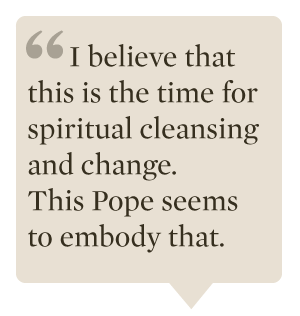 “This new pope, though, is the complete opposite. Use of social media has also helped Francis become ever so hip among the youth and the tech-savvy,” Pancho added, calling Francis a “walking research subject for anything PR-related.”
“This new pope, though, is the complete opposite. Use of social media has also helped Francis become ever so hip among the youth and the tech-savvy,” Pancho added, calling Francis a “walking research subject for anything PR-related.” In June 2012, eight months before Benedict XVI resigned, the Church hired seasoned Vatican reporter Greg Burke as its new PR man. Burke, who had worked for Time and Fox News, is an Opus Dei member and a “faithful Catholic.”
“These photos of Pope Francis with babies I can only see as the footprints of this guy who's an expert on PR,” said Red Tani. “I'm awestruck by this guy. It's a change of image and tone, but as far as meaningful change you don't see any.”
Tani, who founded the Filipino Freethinkers to advocate secularism and “to free people from the shackles of dogma [so that they will be] more informed by science and logic,” said he is a secular humanist and an atheist.
He feels that the Pope’s visit will naturally be significant because about 80 percent of Filipinos are Catholic.
But same old, same old?
“Speaking of statistics, a recent survey said that 70 percent of country are for the [reproductive health] law,” Tani said.
This is significant, he said, because despite Francis’ progressive image, his beliefs are in line with the Church’s, while at the same time many Catholics really do have progressive ideas on issues such as contraception.
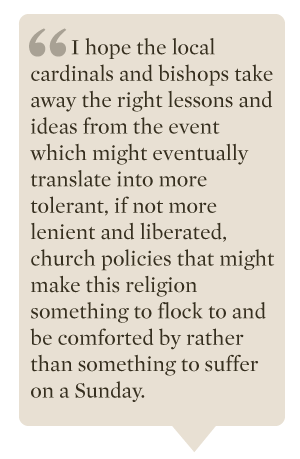
“As far as obeying the Church goes, I don't think that's going to change. I don't think his visit will change that. It will make progressives feel better about choosing their own kind of morality,” he said.
On a lot of issues, said Tani, there’s the same misreading of the Pope’s statements.
“You will find headlines of the Pope taking a hard line, but again if you care to go behind headlines you’ll find it’s not the case.” Tani cited the case of Jozef Wesolowski, the Apostolic Nuncio to the Dominican Republic who was recalled in 2013 after he was accused of child sexual abuse.
“The headlines told you the Vatican arrested him, give you impression [Francis is] better than other popes, but the crimes of this person have been reported to him way before, and he sat on it and didn't do anything about it until it was shown on TV and it became a huge scandal and the church had to act.”
In August, Wesolowski was stripped of diplomatic immunity, meaning he could now be tried by Dominican courts as well as courts in his native Poland.
He was arrested in the Vatican, the first in the city-state for the crime of pedophilia.
But, “They chose to put the guy in ‘house arrest,’ though he was able to roam the Vatican freely until recently when he was confined to one building,” said Tani. “The Church is still not doing what it promised to do. This is the Church deciding to do what to do with their own.”
The Francis effect
“With Francis there’s a lot of expectation of progressiveness, but when you read behind the headlines he's just like any other pope,” Tani said.
But the benefit of the reporting on Francis, he said, is that in showing him to be more accepting, he’s at least not making the flock more hidebound.
“As far as his effect goes, he's keeping people in the Church but he's not making them more conservative, so I'm okay with that. They're still as progressive as ever and that will not change.”
Tani added that he did not dislike the Pope.
“It’s not that I don’t like him, but I don't like what people are misunderstanding about him,” said Tani. “As far as I'm concerned, he’s doing his job. His faith is in peril and he's doing his job, but let's not pretend he's progressive.”
Pulling the Church into the 21st century
Writer Karl R. De Mesa said that he was “raised by communist parents,” and that he decided “to dabble in a lot of occult and grow up more pagan and New Age-y than anything else.”
“I was a bad Catholic to say the least,” he said, and said all the preparation and prep work he therefore had to go through for his recent church wedding “contrasts greatly—sometimes flies in the face of—what Pope Francis seems like he's trying to do: to pull the church into the 21st century and make it more about the spirit of compassion, understanding, and generosity, rather than empty (often outdated) rituals and ceremonial details.”
De Mesa said he has no actual expectations about the Pope’s visit. “But I hope the local cardinals and bishops take away the right lessons and ideas from the event which might eventually translate into more tolerant, if not more lenient and liberated, church policies that might make this religion something to flock to and be comforted by rather than something to suffer on a Sunday, fidgeting in stiff clothes, wishing for an ice cream rather than listening to an old guy scold me about sex, drugs, and fashion choices which I suspect he knows very little about.”
How Catholic is the ‘deeply Catholic’ Philippines?
But how Catholic are Filipinos, really? A Social Weather Stations survey published April 2013 uncovered some unexpected results.
Catholics are the largest religious group in the country by far—74.2 million, or 80.6 percent of the total population, according to the latest official data from the Census. The number is pretty evenly divided among men (50.5 percent) and women (49.5 percent), with a little over half of the total number (52.31 percent) aged 24 or younger.
Catholics are the largest religious group in the country by far—74.2 million, or 80.6 percent of the total population, according to the latest official data from the Census. The number is pretty evenly divided among men (50.5 percent) and women (49.5 percent), with a little over half of the total number (52.31 percent) aged 24 or younger.
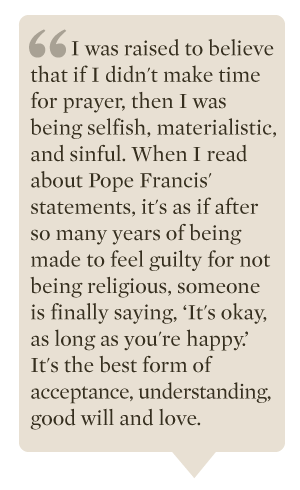
According to the Pew Research Center’s 2010 estimates, the Philippines has the third largest number of Catholics among countries. It is also the only Asian country among the 10 countries with the largest number of Catholics. Filipinos account for 7 percent of the world’s Catholic population.
However, said the SWS, Catholics are the “least religious” of the groups it surveyed: only 29 percent of Catholics consider themselves “very religious”—compared to 50 percent of Protestants, 43 percent of Iglesia ni Cristo members, 41 percent of those belonging to other Christian denominations, and 38 percent of Muslims.
Furthermore, the 2013 study noted a downward trend of church attendance in the Philippines among Catholics over the last five years: while 18 percent attend church more frequently now than they did in past years, 27 percent attend less frequently now, for a net difference of -9.
However, some good news have just come in for the Church: in the most recent SWS survey published January 13, 2015, 41 percent of Filipino Catholics said they attend church weekly, a small increase from the 37 percent recorded in the April 2013 survey.
Catholics still trail behind members of other religions in terms of weekly church-going: According to the new survey, weekly church/mosque attendance was 89 percent among Iglesia ni Cristo members, 83 percent among Muslims and 72 percent among other Christians.
In 1991, according to the SWS, the percentage of Catholics who said they attended church weekly was 64 percent.
This is the Philippines that the Pope is coming to visit in a matter of hours. The Catholic community is not the monolith outsiders may see it, with many Catholics holding views that go directly against the Church’s, and with as many as 9 percent of Catholics considering leaving the Church.
First of his name
There is one thing that needs to be pointed out: For all of his real and perceived flaws, Pope Francis has demonstrated time and again concern for the poor, for the victims of war, for the sick and suffering.
He named himself after a saint who was known to be a man of poverty. He has made changes to benefit the voiceless that most people wouldn’t even think about, such as installing showers in St. Peter’s Square for the homeless.
Many of the people who will be flocking to the Quirino Grandstand, not to mention those who will be in Tacloban and Palo in Leyte for his appearances there, come from the Philippines’ vast numbers of poor people, the victims of conflict and natural calamities, those ignored and uncared for. They will be there to see the man who has spoken of his love and concern for them. It is perhaps this considerateness that most people are responding to, whether they are Catholic or not, progressive or not, and it might be the quality that might help Francis keep his flock and make changes for the better during his papacy. —KG, GMA News
Tags: popefrancis, popefrancisphlvisit
More Videos
Most Popular




